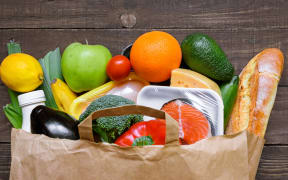
Higher prices were charged by suppliers to supermarkets for about 9000 items in October, according to Infometrics-Foodstuffs New Zealand Grocery Supplier Cost Index . Photo: 123RF
There's little chance grocery price inflation will ease off in the short term, according to an index measuring costs of supplying supermarkets
Cost increases from grocery suppliers to the Foodstuffs co-operatives continued to accelerate last month, as the largest number of items in five years increased in cost.
The Infometrics-Foodstuffs New Zealand Grocery Supplier Cost Index (GSCI) showed a 10 percent a year rise in October.
Produce, butchery, and seafood supplier costs were up by more than 10 percent over the last year, with frozen foods close behind at 9.8 percent a year, according the index.
Higher prices were charged by suppliers to the supermarkets for about 9000 items in October, nearly five times more than in the same month in 2019, before the pandemic.
Not only were more products re-costed, but the increases were bigger, Infometrics principal economist Brad Olsen said. Some 10 percent of all of the items re-costed in October were for increases of more than 20 percent.
Latest StatsNZ data showed the food price index - prices paid by consumers - went up 8.3 percent in the year to September.
"There are intense inflationary pressures at the moment but they are broad-based ... it's across a whole range of areas," Olsen said.
"It's challenging to see at the moment any signs of improvement."
Growers and manufacturers were facing rapid cost rises for inputs and New Zealand was in its highest inflation environment in 32 years.
Those inflationary pressures would be hard to dislodge, he said.
Global food prices had stabilised, but at a high level, while in New Zealand fuel and wage costs remain high, and domestically-based inflation was running at a record 6.6 percent in the last quarter. "That is continuing to drive a very broad-based level of inflation across the economy."
More volatile produce and meat prices were likely to stay high, Olsen said, but general grocery items like tinned goods and dairy may stablise after rising about 9 percent over the last year.
Olsen was not holding out hope that things would materially improve in the short term.
"Looking into 2023 there are expectations that things soften back but also we're not expecting that anyone's food bill becomes cheaper any time soon."
The Infometrics-Foodstuffs New Zealand Grocery Supplier Cost Index (GSCI) measures the change in the cost of grocery goods charged by suppliers to the Foodstuffs North Island and South Island cooperatives.
It uses Foodstuffs NZ data across over 60,000 products the company buys. Foodstuffs NZ has the New World, Pak'nSave and Four Square brands.



